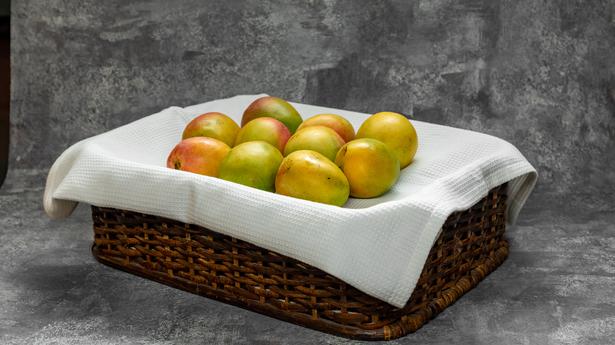
Why is it tougher to find great mangoes this year?
The Hindu
A low yield and late harvest means there are fewer mangoes available for sale, and for higher prices. Yet, agro-entrepreneurs are finding creative ways to connect, from fruit laden picnic tables to farm stays
Nirupama Reddy’s phone has been ringing non stop since the first week of April. Friends and customers are constantly enquiring about the arrival of Banganapalli mangoes from her family-owned farm at Othivakkam, near Chengalpet. “The mango season has had a delayed start this year, and yield has been much lesser due to incessant rains during the flowering season. On our farm, mangoes will be ready for harvesting only by the first week of June [two months later than usual]. Which is why our customers have been anxiously calling us,” she says.
At her Hanu Reddy Raghava Farms, the yield has been drastically hit. Normally, they harvest 60 tonnes of fruit during the season, but this year they are doubtful of getting even 10 tonnes. The situation is the same in farms across the state, unable to satiate the usual demand for mangoes in the months of May and June.
Nevertheless Hanu Reddy Farms will be re-launching its Great Mango Festival to reconnect with customers, inviting families to their farm to spend a day harvesting mangoes, playing traditional games, taking bullock cart rides and sampling traditional food served on a 150 foot-long wooden table. (The event is slated for June 11 and 12, 18 and 19, between 6 am and 12 noon.)
Srinivasan Jayapal, of Salem Mangoes, saw less than 50 percent yield this year, and adds that farmers who tried to salvage damage by sprinkling pesticides could not save it due to the rains. “We procure mangoes from farmers in Salem, Namakkal, Dharmapuri, Krishnagiri and Erode. As the supply is lesser, the cost has doubled this year and so people are buying less.” He adds that quality has been affected as well, “The sweetness in mango is much less. In our region it is Nadusalai, pether, imam pasand, Salem Gundu, Salem Bengalura, Kudaadath and malgova that are most popular.”
“We enjoyed an abundance of supply last year with an extraordinary taste and sweetness, but this year, it is just the opposite,” says Divya Pamuru of Chennai-based Namma Suvai, which supports organic and sustainable farming. “Rain affected the flowering. Then, the recent rains damaged the fruits just before harvest, which makes them rot quickly,” she says, adding, “Whatever fruits we got this year, the taste is compromised. Premium varieties such as Imam pasand and malgova are of even lesser yield.”
Manjula Gandhi Rooban, founder and CEO, Mangopoint, says that besides climatic conditions, another factor that affected mangoes this year was a hurried mango harvest by some farmers. “Mango harvesting is to be done with utmost care. We source our mangoes from in and around Thiruvallur district, where we ask farmers to harvest with the three-centimeter stem intact, or else we refuse to buy. The milk that oozes out of the stem can affect shelf life,” she explains.
Thiruvallur district is also home to the 150-acred Reddy’s Organic Farm, in Anaipakkam village. The farm’s proprietor Sanga Reddy says he too prefers to wait till the mangoes begin to ripen in the trees, before harvesting. Soon after the harvest, he sends dispatches to organic shops in Chennai. He also makes and sells mango pulp, in addition to mozzarella cheese made from native cow’s milk, goat milk cheese, and the region’s signature vaikuntam samba rice.

Podcasts have become our best friends, especially during the Covid-19 pandemic. Whether you are cooking, sketching or going on an evening walk, there is a show that matches your mood. From horror tales to informative conversations to just two friends talking about anything & everything relatable, podcasts have become a part of our lives unknowingly. Over the years, more voices have joined this audio landscape and filled it with stories that resonate with our lives. Podcasts serve as a reminder that everyone has a story worth telling and listening to!










